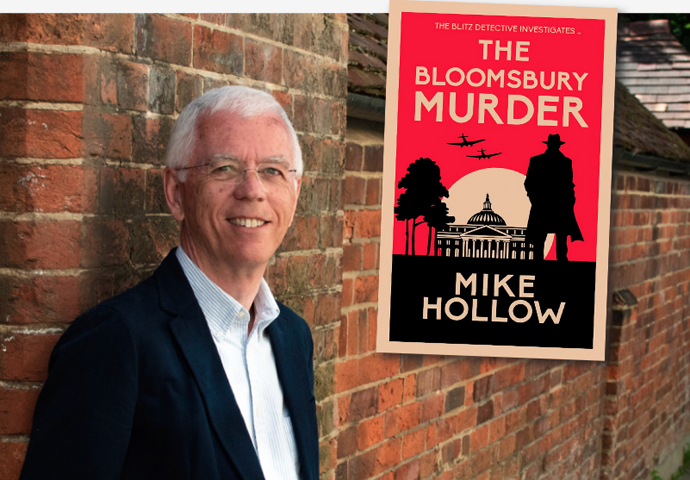Review: The Bloomsbury Murder
In Mike Hollow’s latest intriguing Blitz Detective mystery, DI John Jago sets out to discover who killed a middle-aged widow, whose only crime was helping desperate wartime refugees
Thursday, 20th November 2025 — By Peter Gruner

The Bloomsbury Murder is the 10th in the series by Mike Hollow [Mark Wilson]
SHE may have been one of the most popular women in war-torn Bloomsbury, where she helped support desperate refugees, but Rosemary Webster was hacked to death in her own sitting room by someone with an iron poker.
So begins Mike Hollow’s intriguing new crime fiction book, The Bloomsbury Murder, set in 1941 and featuring the ever-fastidious Detective Inspector John Jago.
Poor widow Rosemary. Middle-aged and originally from Canada, she moved into Colonnade Mews, in Guilford Street, near Russell Square, where she volunteered with the war effort due to her passion for doing her duty.
DI Jago and his keen assistant, young Detective Constable Peter Cradock, arrive at the murder scene but there’s no sign of any disturbance.
Rosemary, who owned the distinguished four-storey property, is found stretched out in a top-floor flat, on a carpet stained with blood, wearing dark green slacks and a thick woolly jumper. A doctor at the scene confirms that it’s likely she died from being beaten with a metal poker about the head.
Her live-in housekeeper Annie McCready, who discovered the body, is the first person the officers interview. She explained that Rosemary was her good friend – they were both war widows – and wanted to make it clear that the victim was a very nice person. “I can’t imagine anyone wanting to hurt her, she was a friend to everyone,” says Mrs McCready.
Rosemary was particularly popular at Bloomsbury House, close to the British Museum, according to Mrs McCready. It was the former Palace Hotel before it became an HQ for a dozen organisations helping refugees. Rosemary not only worked as a volunteer but also brought many desperate refugees to stay with her if they were bombed out or without places to stay.
However, not everyone was so keen on Rosemary.
Mildred Frobisher, also middle-aged and from across the road, is an example. She says: “I think there was a feeling generally in the street that she and her acquaintances had rather lowered the tone, as it were. Bloomsbury was a respectable area, but it’s a matter of regret to me and some others on this street that it’s gone decidedly downhill.
“Half the properties have degenerated into boarding houses and what people call bed-sits, and it’s just not what it was. If you tell anyone in London that you live here now they’ll sneer at you.”
Jago and Cradock drive out to RAF Northolt to speak to Rosemary’s son, Flying Officer Jack Webster. Jack says he’d always feared how his mum would react in the more likely event of him dying while fighting in an aircraft.
“I just feel numb,” he says. “You must think I’m heartless, but I fear that is what this war has done to me. I love my mother, and what you’ve told me is terrible news, but the fact is I’ve seen too much death at close quarters and I’ve lost too many good friends, and there’s never time to grieve. Tears don’t come like they used to. I hope you understand.”
This is the 10th book in The Blitz Detective series, written by Hollow and featuring DI Jago and DC Cradock. Review also enjoyed The Camden Murder in 2023, then described by The Historical Novel Society as an “excellent police procedural, authentic and detailed in historical context”.
In an interview with Review, Mike said that his character Rosemary, in volunteering to help refugees, was based on many people who did the same thing during the war. For example, Rosemary also helped with the scheme to bring Jewish children out of Nazi Germany before the war.
He also pointed out that “Sadly, the number of people who fought or helped in the last war are diminishing, they are getting old and many are dying out.”
He added that most of the refugees helped by the organisations based at Bloomsbury House arrived in this country homeless and penniless, with just the clothes they stood up in. “They were given shelter and support mainly with private individuals like Rosemary.”
• The Bloomsbury Murder. By Mike Hollow, Allison and Busby, £22